Live on the homepage now!
Reader Supported News
Her putative opponent saved her from an idiot news cycle by dancing on his own dick.
Just a few years ago, Atlanta's suburbs were congressional battlegrounds. In 2020, policy professor Bourdeaux defeated a Republican. In the district next door, prominent gun control advocate McBath did the same in 2018. But when Republican lawmakers redrew the maps last year, they made McBath's 6th Congressional District a lot more friendly to Republicans by squeezing as many Democrats as possible into the 7th District, which is represented by Bourdeaux. Two competitive districts became one very red district and one very blue district.
"She made her choice and we just have to go with it," says Laura Raymond, who's voting for Bourdeaux and is working the sign-in table. Raymond thinks McBath could have mounted a competitive race in her original district, rather than taking on Bourdeaux. "I have found more Democrats who thought they were the only ones in their neighborhood and they're not," Raymond says.
Which is just the kind of polite ill-feeling that the gerrymander leaves behind like slime as it passes. But the real action is in the race for governor, in which we are rediscovering the fact that presumptive Democratic nominee Stacey Abrams pretty much scares the SansaBelts off every Republican in the country, but especially the Republicans in Georgia. Over the weekend, addressing a local fundraiser, Abrams said the following, as reported by NBC News:
“I am tired of hearing about being the best state in the country to do business when we are the worst state in the country to live. “Now, somebody’s going to try to Politifact me on this—let me contextualize,” Abrams continued. “When you’re No. 48 for mental health, when you’re No. 1 for maternal mortality, when you have an incarceration rate that’s on the rise and wages that are on the decline, then you are not the No. 1 place to live in the United States. But we can get there. You see, Georgia is capable of greatness. We just need greatness to be in our governor’s office.”
These remarks, of course, were nothing unusual. I literally never have covered a presidential or gubernatorial race in which a challenger didn’t bad-mouth the state or the country, usually blaming it on the incumbent. In 1980 Ronald Reagan couldn’t go five minutes without running the country down while blaming Jimmy Carter. Abrams didn’t pin the conditions she cited on any individual, but I give her credit for her pre-emptive strike against the Gaffe Police, who already were cranking up the sirens. Fortunately, Abrams got saved from an idiot news cycle by one of her putative opponents. From the Washington Post:
Former senator David Perdue, who is trailing in the polls for Georgia’s GOP gubernatorial nomination, on Monday attacked Stacey Abrams, the Democrat running unopposed in her primary, by claiming she’s “demeaning her own race.” During a campaign stop in Dunwoody, Ga., Perdue asked the crowd whether they had seen “what Stacey said this weekend.” “She said that Georgia is the worst place in the country to live,” Perdue said. “Hey, she ain’t from here. Let her go back where she came from if she doesn’t like it here.”
Presto-change-o. Thanks to the intervention of a guy who was likely to lose the Republican primary by fat double-digits to incumbent Brian Kemp, the story shifts from Abrams Gaffe Roils Race to Perdue makes racist remark about Abrams: She’s ‘demeaning her own race.’ And that was the actual headline the Post ran on its story. Well-struck, former senator Perdue. Hard to believe that you lost your Senate seat and now will get run over by the whole train in the race for governor. There is absolutely no Democrat alive who makes Republicans more nervous than Stacey Abrams does. She makes them dance like Gregory Hines all over their own dicks.
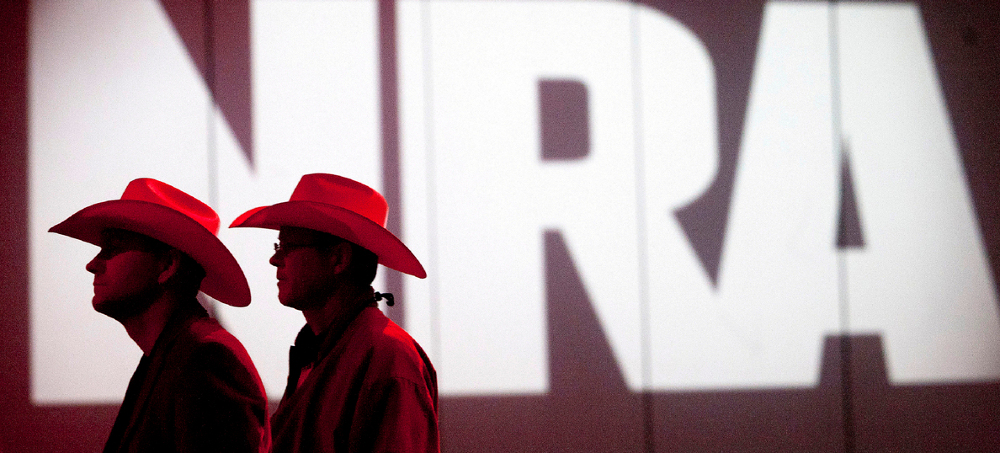 Republican heavyweights are still set to speak at the National Rifle Association's annual meeting this weekend in Houston. (photo: Getty)
Republican heavyweights are still set to speak at the National Rifle Association's annual meeting this weekend in Houston. (photo: Getty)
READ MORE
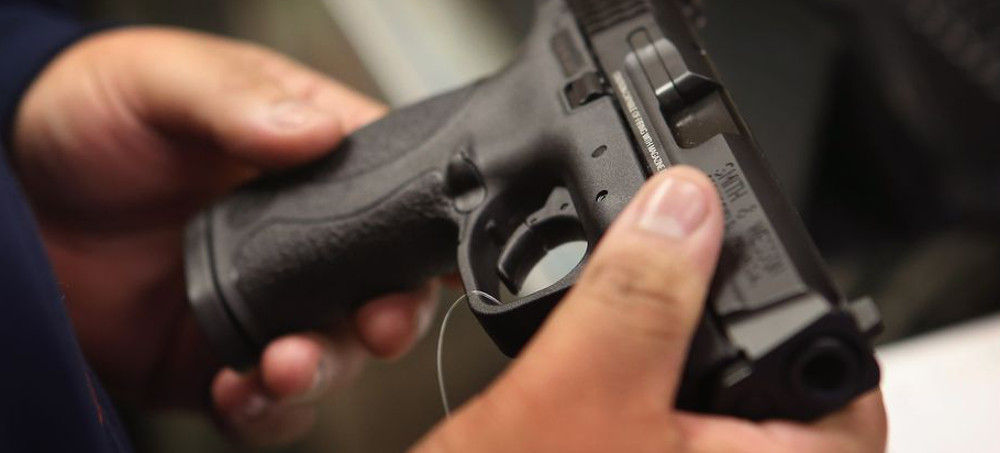 In general, the US has very relaxed gun laws compared with its developed peers. (photo: Scott Olson/Getty)
In general, the US has very relaxed gun laws compared with its developed peers. (photo: Scott Olson/Getty)
In general, the US has very relaxed gun laws compared with its developed peers.
One reason for this difference is the abundance of guns in America. According to a 2007 survey, the US led the world in the number of civilian-owned firearms with 88.8 guns per 100 people, while second-place Yemen fell far behind at 54.8 guns per 100 people. And the research, compiled by the Harvard School of Public Health's Injury Control Research Center, has repeatedly found a link between a higher number of guns and higher levels of gun violence.
A common explanation for this is that America has some of the most lax gun laws in the world. But are US gun laws really that different from those of other developed nations?
I looked into that question, breaking down gun laws in several developed countries based on media reports, studies on gun violence, national databases, the Law Center to Prevent Gun Violence's analysis of American gun laws, and the Law Library of Congress's reviews of gun laws around the world.
I found the US really does have the most relaxed gun control measures in comparison with other developed nations.
Based on the research, that's a significant reason the US leads its developed peers in gun violence. A 2016 review of 130 studies in 10 countries, published in Epidemiologic Reviews, found that new legal restrictions on owning and purchasing guns tended to be followed by a drop in gun violence. That's a strong indicator that restricting access to guns can save lives.
Here's a guide to the gun control laws of some of the countries I looked at: the US, the United Kingdom, Canada, Switzerland, and Japan — a mix of wealthy nations with similar and varying cultural backgrounds.
United States
Gun ownership rate (2007): 88.8 guns per 100 people
Gun homicide rate (2012): 29.7 per 1 million people
How gun control works: There are several barriers to buying a gun in America, but there are generally so many loopholes in the current laws — even fairly restrictive city and state laws — that most people can buy a gun without too much of a problem.
Some people are technically prohibited from buying guns. People who are underage (under 18 for rifles and shotguns, and under 21 for other guns), someone convicted or indicted for a crime punishable by imprisonment of more than one year, fugitives from justice, the severely mentally ill, unlawful users of controlled substances, those convicted of domestic violence, and undocumented immigrants are among some of the categories of people barred from buying a firearm by federal law.
Some types of guns are also restricted. Under federal law, fully automatic weapons are technically legal only if made before 1986, so it's illegal to manufacture new automatic weapons for civilian use. Automatic weapons also tend to have more restrictions and registration requirements than other guns. Meanwhile, semiautomatic and non-automatic firearms are generally legal, barring state laws. And some states also ban high-capacity ammunition magazines.
Restrictions on purchasers are typically evaluated through a background check. Under the federal system, licensed dealers are required to run these checks before they can sell someone a gun, typically by having the FBI check a person's criminal record, mental health history, and other factors. If someone fails a background check, he or she can't legally buy a gun.
The most well-known way to bypass background checks is the private sales loophole: If someone purchases a gun from a private seller, such as a friend or family member, no gun background check is required. This is often mischaracterized as the gun show sale loophole, under the assumption that people can simply go to a gun show and buy a gun without getting a background check. But licensed dealers at gun shows still have to carry out a background check. The actual loophole is that someone can meet with a private seller at a gun show — or, increasingly, over the internet — and buy a firearm from that person without a background check. In other words, the gun show doesn't create a loophole; the private seller does.
But an equally big problem is that the system of background checks is notoriously underfunded, understaffed, and underresourced, allowing red flags to slip through. Although there are no waiting periods under federal law, a check that turns out inconclusive can be extended for three business days for further investigation. But these three days are a maximum for the government — and sometimes, the three days lapse without the FBI completing its check, and a buyer can, at that point, purchase a gun without the completed check.
The FBI admitted that something like this happened for Dylann Roof, who killed nine people at a predominantly black church in Charleston, South Carolina, in 2015: Roof should have failed a background check for a handgun purchase after admitting to illegally possessing controlled substances in the past, but the FBI examiner did not obtain the shooter’s record in time.
The federal background check system also largely relies on states' reports, including some data for mental health history and criminal records. Since states have their own budget issues to deal with, or may simply ideologically oppose the idea of background checks, states' noncompliance can create yet another way the system can fail to stop someone who shouldn't buy a gun from obtaining one.
Of course, state laws vary widely. Some states restrict and ban certain types of firearms, particularly assault weapons. A few require certain licenses, registration, or training to buy and own certain guns. Several states ban or restrict open carry, and many require permits for concealed carry. Some require background checks and permits for private sales, and several rely on their own background checks instead of only the federal system. And many states try to make it as easy as possible to buy, own, and carry any type of gun. (Slate has a good rundown of differences in state laws.)
Many gun restrictions are limited by the Supreme Court's recent interpretations of the Second Amendment. For instance, the court struck down Washington, DC's handgun ban in 2008, citing an individual's right to bear arms.
Broadly speaking, studies have found that states with stricter gun control laws have fewer gun deaths, and places — not just states, but cities and countries, too — with fewer guns have less gun violence after controlling for socioeconomic variables and other types of crime.
Generally, America's gun laws are far more relaxed than those of the other countries on this list. And even if your city or state is restrictive, interstate travel is so easy that it's fairly easy to go to another state to buy a gun, although this runs afoul of some states' laws. Several analyses of places with restrictive gun laws — Chicago and Illinois or "the Iron Pipeline," for example — have found that's exactly what happens in many cities and states, with guns typically flowing in from neighboring or nearby jurisdictions with laxer gun laws. The result: If you want to buy a gun in America, there's almost certainly a way to do just that, regardless of your local laws.
Canada
Gun ownership rate (2007): 30.8 guns per 100 people
Gun homicide rate (2012): 5.1 per 1 million people
How gun control works: Canada keeps guns somewhat accessible to the general population, but maintains major restrictions on different types of guns, who can buy them, and how they're purchased. The result is a system that looks like a stricter version of the US — so some sort of firearm ownership is still a possibility, but not something that's done very easily.
Canada puts guns into three categories: prohibited (most handguns that have a short barrel or are .32 or .25 caliber, fully automatic weapons, guns with sawed-off barrels, and certain military rifles like the AK-47), restricted (some handguns, some semiautomatic rifles, and certain non-semiautomatic rifles), and non-restricted (regular and some military-style shotguns and rifles). The general idea is that more dangerous guns face much harsher regulations and restrictions on purchase, ownership, and storage.
Prohibited guns are, as their name implies, prohibited, but people who obtained and maintained a registration certificate before they were banned in December 1998 can keep those specific guns. All restricted and prohibited firearms must be registered, but non-restricted guns no longer have to be registered after April 2012.
In general, you must be 18 or older to buy a gun in Canada. Some exceptions are made for minors 12 to 17 owning a non-restricted firearm — but only if a licensed adult is responsible for the gun.
Canada requires a license to own a gun and ammunition, and buyers to pass safety course tests. Licenses must be renewed every five years.
Licensing requires fairly stringent background checks. An "applicant for a firearm license in Canada must pass background checks, which consider criminal, mental, addiction and domestic violence records," according to the Library of Congress's review of Canada's laws. The background checks also consider whether an applicant has been treated for a mental illness, if the person was associated with violence, threats, or attempted violence, and whether the person has a history of any behavior "that includes violence or threatened or attempted violence on the part of the person against any person." On top of traditional background checks, each license applicant needs to submit third-party character references.
In addition to licensing requirements, Canadians can only obtain a permit to carry firearms in public in very limited circumstances — typically with the requirement that "an individual needs restricted firearms or prohibited handguns for use in connection with his or her lawful profession or occupation" or to protect life. There are no such federal requirements in the US, although some states place certain restrictions or bans on concealed and open carry.
Unlike federal laws in the US, Canadian laws require safe gun storage — locked in a room, compartment, or container that's difficult to break into, with a trigger or cable lock, or both, depending on the type of firearm. Guns must be unloaded when stored. And similar storage requirements apply to guns that are being transported, with laxer rules for non-restricted firearms compared to prohibited and restricted ones.
United Kingdom
Gun ownership rate for England and Wales (2007): 6.2 guns per 100 people
Gun homicide rate for England and Wales (2012): 0.7 per 1 million people
How gun control works: The United Kingdom maintains some of the strictest gun laws in the West and the world, which helps explain why it also has some of the lowest levels of gun homicide among developed nations.
For one, handguns are generally banned, with exceptions only for police officers, members of the armed forces, and people with special permission from the home secretary. Military-style weapons are also prohibited.
For other types of firearms and ammo, individuals must go through a stringent licensing process. They must give a "good reason" — such as job requirements, sport, or shooting vermin — to own a gun. Self-defense is not considered a good reason. Local police chiefs are expected to verify that an applicant's reasons for owning a gun are legitimate. For example, police might see if a person really has vermin in his or her house to the point that it requires a certain type of gun to deal with the pests.
Gun owners also must meet background checks, which involve a review of a person's criminal record, mental illness, alcoholism, drug addiction, and references regarding mental state, home life, and attitudes toward guns. Licenses must be renewed every five years, although they can be revoked earlier if police find that someone's gun ownership poses public safety risks or a person no longer has a good reason for the license.
The UK also has an age requirement of 18 for gun ownership. Firearm ownership also might involve storage requirements that meet "British safety standards," which are evaluated by local police, who particularly check the possibility of unauthorized access to guns by an owner's family members or other associates.
One major exemption to the licensing requirements: People can participate in gun clubs even if they don't hold a certificate "when engaged as a member of the club in connection with target shooting," according to the Library of Congress's review of UK laws. But these gun clubs must meet all sorts of criteria, including security and storage arrangements for guns and ammo.
Gun laws can be enforced very strictly: Anyone found unlawfully possessing a firearm faces a five-year mandatory minimum prison sentence.
The UK passed many of its gun restrictions in response to public outcry after several mass shootings. One of the shootings sounds eerily like the Sandy Hook Elementary School shooting that took place in Connecticut in 2012, as described by Clare Feikert-Ahalt for the Library of Congress: In 1996, "Thomas Hamilton walked into a primary (elementary) school in Dunblane, Scotland, and shot and killed 16 small children, aged four to five, and their teacher in the school gym before killing himself. Hamilton lawfully held the two rifles and four handguns that he used for the massacre, and had lawfully held firearms for almost 20 years prior to this incident."
According to Feikert-Ahalt's report, law enforcement's consensus in the UK is that the restrictions did not stop all gun violence, but did limit it. And although the rules are strict, more than 700,000 certificates were in effect for the period between 2008 and 2009, suggesting that gun ownership is certainly possible despite the hurdles involved.
Switzerland
Gun ownership rate (2007): 45.7 guns per 100 people
Gun homicide rate (2012): 7.7 per 1 million people
How gun control works: Switzerland is perceived to have one of the more accepting cultures toward guns in Europe. Laws let militia members in the country (where all able-bodied men are required to serve in the military, except for conscientious objectors) keep their issued personal weapons in their homes, and Swiss statutes and traditions respect the right to bear arms.
But the country's restrictions are still somewhat more stringent than the US.
For one, automatic weapons are outright banned for civilians.
Private gun ownership generally requires a license, for which an applicant "must be at least 18 years of age, may not have been placed under guardianship, may not give cause for suspicion that he would endanger himself or others with the weapon, and may not have a criminal record with a conviction for a violent crime or of several convictions for nonviolent crimes," according to the Library of Congress's review of Swiss gun laws. The license is valid for six to nine months, and it's usually valid only for one weapon.
But rifles and semiautomatic long arms used by recreational hunters are exempt from licensing requirements.
The licensing requirement also only applies to dealers, with an exemption for private sellers. Still, the law requires private sellers to verify the identity and age of the buyer by checking an official identification document, and private sellers must have no reason to believe the buyer has been or should be disqualified from firearm ownership — requirements that aren't necessary for private gun sales under US federal law.
For anyone to carry a gun for defensive purposes, the licensing process requires the applicant to demonstrate the need to protect himself or others and pass an exam. But no carrying license is required for transporting an unloaded weapon for "legitimate purposes" like hunting and traveling to a shooting range, as long as the ammo is kept separate from the weapon. In comparison, the license to carry is a requirement that only exists in a minority of US states.
In recent years, Switzerland has reformed its gun laws for militia members after several incidents in which militia members killed themselves or others with their issued weapons. In 2010, for instance, rules were amended to let militia members voluntarily deposit their guns in an armory. And if police, courts, prosecutors, or a military commandant finds danger of abuse or improper handling or maintenance of a militia member's personal weapon, it can be confiscated — with the possibility of further punishments, including fines and imprisonment.
Switzerland's restrictions show that a country can have a culture that is broadly more receptive to the idea of gun ownership while maintaining some restrictions that make firearms less accessible to potentially dangerous people and improve public safety. But it's perhaps no coincidence that the country is second only to America among developed nations in terms of firearm homicide deaths — although the Swiss rate is still four times lower than the US's rate.
Japan
Gun ownership rate (2007): 0.6 guns per 100 people
Gun homicide rate (2012): 0.1 per 1 million people
How gun control works: Japan makes it very hard to buy and own guns, with some of the strongest gun control laws in the world. The system is so restrictive that even Japan's criminals, which through the notorious yakuza can be highly ingrained in corrupt government agencies, largely see gun ownership as a liability, as Vox's Zack Beauchamp explained.
"Under current laws, if a low-level yakuza is caught with a gun and bullets that match, he’ll be charged with aggravated possession of firearms and will then face an average seven-year prison term," longtime Japan correspondent Jake Adelstein wrote in the Japan Times. "Simply firing a gun carries a penalty of three years to life. And … a yakuza boss may decide a death sentence is more appropriate if his thug miraculously gets released on bail before going to jail [because accomplice laws could get the boss indicted along with his subordinate]."
In a 2012 article for the Atlantic, Vox's Max Fisher explained the rigorous process for buying and owning a firearm, which can only be done for special purposes like hunting, professional necessity, and gun competitions:
To get a gun in Japan, first, you have to attend an all-day class and pass a written test, which are held only once per month. You also must take and pass a shooting range class. Then, head over to a hospital for a mental test and drug test (Japan is unusual in that potential gun owners must affirmatively prove their mental fitness), which you'll file with the police. Finally, pass a rigorous background check for any criminal record or association with criminal or extremist groups, and you will be the proud new owner of your shotgun or air rifle. Just don't forget to provide police with documentation on the specific location of the gun in your home, as well as the ammo, both of which must be locked and stored separately. And remember to have the police inspect the gun once per year and to re-take the class and exam every three years.
In addition to these requirements, there are age restrictions for gun ownership — 18 generally, 14 for athletes, and 20 for hunters. People can't fire their guns except for the specific reasons given for obtaining a firearm in the first place. And officials have enormous authority for supervising someone's gun ownership, including the ability to conduct nationwide inspections of gun owners' weapons and storage facilities — with prior notice to gun owners — and the ability to require owners to temporarily submit guns to the authorities following a disaster or incident that disturbs the public peace.
On top of those restrictions, there's a separate permit for buying ammunition, which can also limit how much ammo someone can buy.
Civilian possession of handguns is also banned, except for research purposes.
Partly as a result of its stringent laws, Japan has very low levels of gun violence — not just compared with the US, but compared with any other country. As Fisher wrote in 2012, there was a bit of a national scandal when the number of gun homicides in Japan — a country of nearly 130 million — rose from two in 2006 to 22 in 2007, even though both are shockingly low rates of gun homicides. In 2013, the gun homicide rate was 350 times higher in the US than in Japan.
None of this is to suggest that one could simply import Japanese — or other nations' — gun laws to the US, easily implement such policies, and see US gun violence fall to match its developed peers. After all, the US, Japan, the UK, Canada, and Switzerland are very different countries with varied cultural and socioeconomic influences. And non-US countries started with comparatively few guns in circulation, so it's been relatively easy to restrict guns and keep their prominence low — whereas the US now has more guns than people, so it would be much harder to scale back access to firearms and levels of gun ownership.
But based on the research and other countries' experiences, more restrictive gun laws could at the very least make shooting deaths much less common in the US.
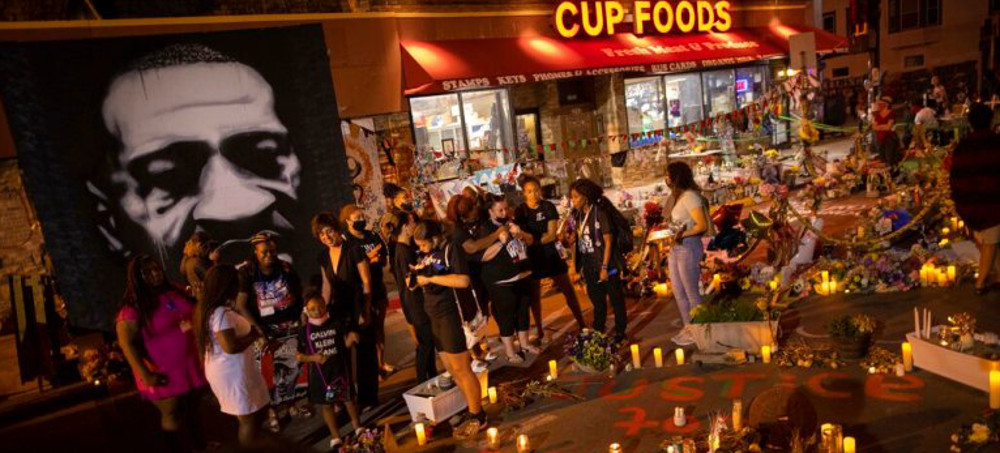 A candlelight vigil to honor Floyd's memory at the intersection where he died was among the remembrances scheduled for Wednesday's second anniversary of the Black man's killing at the hands of Minneapolis police. (photo: Christian Monterrosa/AP)
A candlelight vigil to honor Floyd's memory at the intersection where he died was among the remembrances scheduled for Wednesday's second anniversary of the Black man's killing at the hands of Minneapolis police. (photo: Christian Monterrosa/AP)
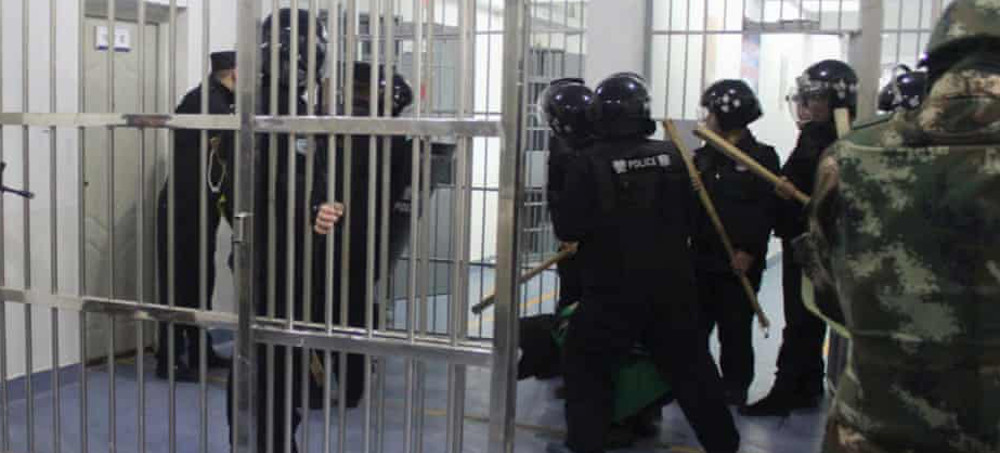 One of the leaked images. China's ruling Communist party is accused of detaining more than 1 million Uyghurs and other Muslim minorities in Xinjiang. (photo: BBC)
One of the leaked images. China's ruling Communist party is accused of detaining more than 1 million Uyghurs and other Muslim minorities in Xinjiang. (photo: BBC)
Documents detailing shoot-to-kill policy for people who try to escape published as UN human rights chief visits region
The data trove – referred to as the Xinjiang police files and published by a consortium of media including the BBC – dates back to 2018 and was passed on by hackers to Dr Adrian Zenz, a US-based scholar and activist, who shared it with international media earlier this year. It includes thousands of photographs of detained people and details a shoot-to-kill policy for people who try to escape.
The ruling Communist party is accused of detaining more than 1 million Uyghurs and other Muslim minorities in the far-western region as part of a years-long crackdown the US and politicians in other western countries have labelled a “genocide”. In addition to mass detentions, researchers and campaigners accuse Chinese authorities of waging a campaign of forced labour, coerced sterilisation and the destruction of Uyghur cultural heritage in Xinjiang.
Chinese officials and diplomats call such allegations “lies of the century” and insist that Beijing’s policy in Xinjiang is concerned with counter-terrorism, de-radicalisation and vocational training.
In a separate academic paper published on Tuesday, Zenz wrote that the newly leaked files explained how political paranoia that promoted exaggerated threat perceptions had led to the pre-emptive internment of large numbers of ordinary citizens. He was targeted by Chinese sanctions last year.
In October, the Associated Press reported that Chinese authorities had scaled back many of the most controversial methods adopted in Xinjiang. “The panic that gripped the region a few years ago has subsided considerably, and a sense of normality is creeping back in,” its report said.
On Tuesday China’s ambassador to the UK, Zheng Zeguang, tweeted: “Such a shame for BBC to carry the fabricated story about so-called ‘detention camps’. Pathetic for the media, in cahoots with the notorious rumour monger, to once again spread disinformation about Xinjiang.”
Tuesday’s publication of the mass data leak coincided with Bachelet’s controversial trip to Xinjiang. The former Chilean president told a group of China-based diplomats on Monday that her trip was aimed at promoting, protecting and respecting human rights, according to Bloomberg News, citing sources who attended the invitation-only online meeting. She did not say it was an “investigation”.
Bachelet is the first top UN human rights diplomat to visit China since 2005, and critics of the Beijing government have expressed fears that the authorities would organise what they called a “Potemkin-style tour” for her.
The US and the UK have both expressed scepticism over what could be realistically achieved on Bachelet’s trip. The British ambassador to China, Caroline Wilson, tweeted on Monday that she had “stressed the importance of unfettered access to Xinjiang and private conversations with its people,” in her call with the UN rights chief.
The UK foreign secretary, Liz Truss, said on Tuesday that the leaked files contained “shocking details of China’s human rights violations” against the Uyghur Muslim population.
“We reiterate our longstanding expectation that China grants the UN high commissioner for human rights full and unfettered access to the region so that she can conduct a thorough assessment of the facts on the ground, and we are following her visit this week closely,” Truss said in a statement. “If such access is not forthcoming, the visit will only serve to highlight China’s attempts to hide the truth of its actions in Xinjiang.”
German foreign minister Annalena Baerbock, who held an online meeting on Tuesday with her Chinese counterpart, Wang Yi, called for a transparent investigation after “shocking reports and new evidence of very serious human rights violations in Xinjiang”.
“Human rights are a fundamental part of the international order and Germany is committed to protecting them worldwide,” Baerbock said. “I think it’s important that these accusations, which have been known for a long time, are addressed by the Chinese side, and I made that very, very clear in this morning’s discussion.”
Germany’s economy minister Robert Habeck called the latest reports of internment, mistreatment and forced labor of Uyghurs “particularly shocking”. Habeck said Germany for years had shied away from looking too closely at the problematic human rights record of its close trading partner, but that the country’s new center-left government was taking a different approach.
Germany would scrutinize environmental, social and human rights aspects when considering German companies’ requests for loan guarantees for their investments in China, he said. “We will also examine very closely Chinese firms’ takeover bids in Germany,” he added, saying one recent offer was prohibited while another was withdrawn by the company after questions were raised.
The US ambassador to the United Nations, Linda Thomas-Greenfield, echoed the concerns. She tweeted: “Horrified by the Xinjiang Police Files, which spotlight China’s mass incarceration of Uyghurs and other ethnic and religious minorities.” Thomas-Greenfield also said that Bachelet and her office “must take a hard look at these faces and press Chinese officials for full, unfettered access and answers.”
Bachelet is expected to visit the Xinjiang cities of Ürümqi and Kashgar on Tuesday and Wednesday as part of a six-day tour. The Chinese foreign minister, Wang Yi, meanwhile told Bachelet on Monday that he hoped her trip would “clarify misinformation” on China’s human rights record.
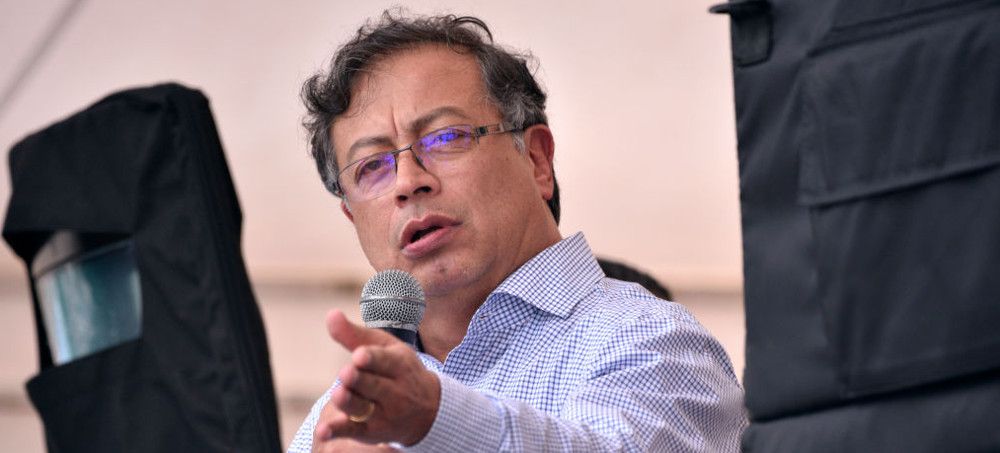 Colombian presidential candidate Gustavo Petro speaks during a campaign rally on May 11, 2022, in Fusagasugá, Colombia. (photo: Guillermo Legaria/Getty)
Colombian presidential candidate Gustavo Petro speaks during a campaign rally on May 11, 2022, in Fusagasugá, Colombia. (photo: Guillermo Legaria/Getty)
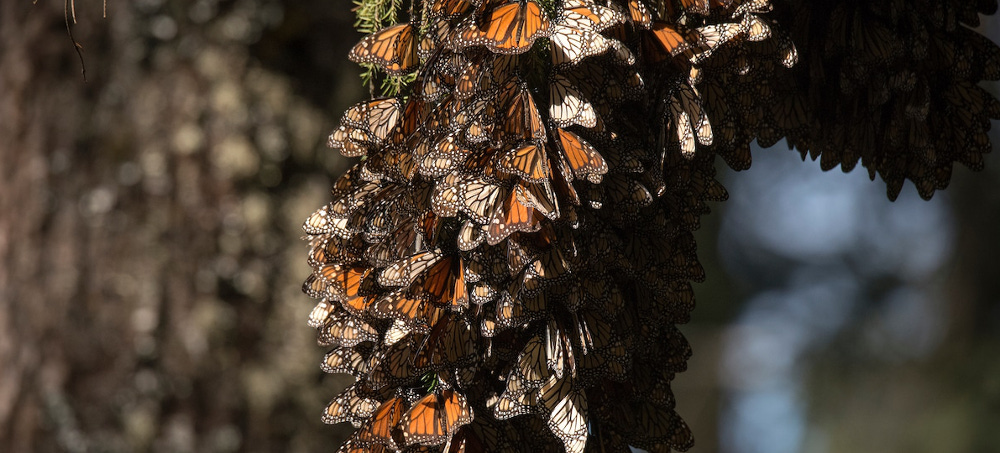 Monarch butterflies roost in an oyamel fir at the Sierra Chincua Monarch Butterfly Preserve, Mexico. (photo: WWF-Mexcio)
Monarch butterflies roost in an oyamel fir at the Sierra Chincua Monarch Butterfly Preserve, Mexico. (photo: WWF-Mexcio)
The survey, Forest Area Occupied by the Colonies of Monarch Butterflies in Mexico During the 2021-2022 Overwintering Season, measured the amount of forest the butterflies cover, since it is too difficult to count each butterfly. In total, WWF-Mexico noted that 10 colonies of monarch butterflies spanned 2.835 hectares (7.005 acres) of forest in late December 2021, up 35% from the 2.10 (5.189) hectares covered in 2020. Six colonies covered 2.174 (5.372 acres) hectares inside the Monarch Butterfly Biosphere Reserve, a World Heritage Site. An additional 0.661 hectares (1.633 acres) of forest outside the reserve were also covered in butterflies.
“The increase in monarch butterflies is good news and indicates that we should continue working to maintain and reinforce conservation measures by Mexico, the United States, and Canada,” Jorge Rickards, general manager of WWF-Mexico, said in a press release. “Monarchs are important pollinators, and their migratory journey helps promote greater diversity of flowering plants, which benefits other species in natural ecosystems and contributes to the production of food for human consumption.”
The forest coverage for monarch butterflies varies from year to year, but it has been on a general decline for decades. In the 1996-1997 overwintering period, experts measured 18.19 hectares (44.726 acres) of forest covered in butterflies. In recent years, the butterflies covered just over 6 hectares in 2006-2007 and 2018-2019.
Several factors contribute to the overall population decline. Monarch butterflies rely on milkweed for reproduction, but agricultural practices, including reliance on Round-Up-ready crops, has depleted the number of milkweed plants across the migration route. Other insecticides and herbicides, as well as the bacterial pesticide Bacillus thuringiensis, further threaten the butterflies, as do parasites and pathogens.
Illegal logging has decreased the amount of forests in the reserve and beyond where butterflies migrate to. Climate change has also impacted the migration of monarch butterflies, as the increasing temperatures can shift environmental cues for migration and make their overwintering habitat too warm.
The latest population survey gives hope for recovery for monarch butterflies, but more work is needed to combat the threats that have contributed to their steady decline.
Special Coverage: Ukraine, A Historic Resistance
READ MORE
Follow us on facebook and twitter!
PO Box 2043 / Citrus Heights, CA 95611


No comments:
Post a Comment
Note: Only a member of this blog may post a comment.